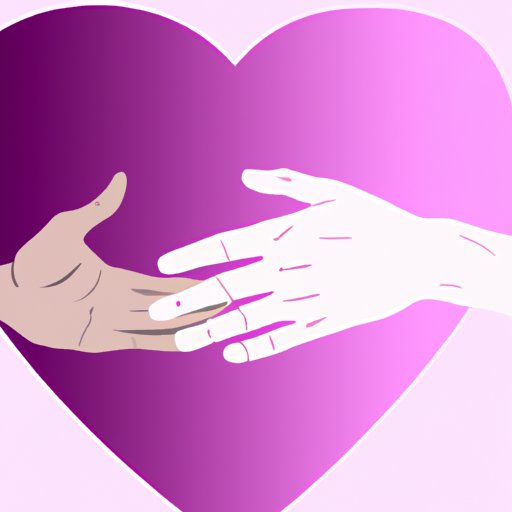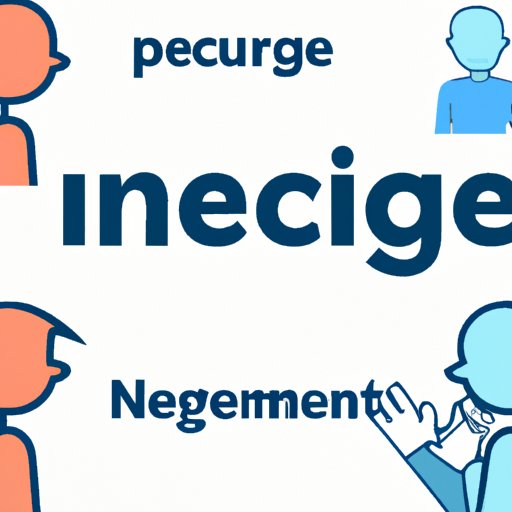Introduction
It’s not always easy to be a nicer person. We all want to be kind and understanding to those around us, but it can be difficult to know how to do that in a meaningful way. So what does it mean to be a nicer person? In essence, it means being a kinder, more compassionate version of yourself. It means showing empathy and understanding towards others, being generous with your time and resources, practicing active listening, avoiding gossiping or speaking ill of others, making an effort to build relationships, apologizing when you make mistakes, and expressing positivity and kindness in your words and actions.

Show Empathy and Understanding Towards Others
Empathy is the ability to understand and share the feelings of another. It is an important part of being a nicer person because it allows us to connect with others on a deeper level. Studies have shown that displaying empathy can lead to more satisfying relationships and better overall mental health.
In order to demonstrate empathy and understanding towards others, it’s important to practice active listening. This means listening attentively to what someone is saying without judging or trying to fix their problems. Instead, focus on understanding their perspective and validating their feelings. Additionally, it’s important to avoid interrupting and to be mindful of body language. Showing genuine interest in what someone is saying can go a long way in demonstrating empathy and understanding.
Be Generous with Your Time and Resources
Being generous with your time and resources is another way to be a nicer person. Giving your time and resources to help others can be incredibly rewarding. It can also strengthen relationships and promote a sense of community.
When it comes to giving your time and resources, it’s important to be thoughtful and intentional. Consider how your resources could be used most effectively to help others. Also consider how much time you realistically have to give. Setting boundaries is key to being generous without feeling overwhelmed.
Practice Active Listening
Active listening is an important skill for being a nicer person. It involves listening carefully to what someone is saying and responding in a way that shows you are interested and engaged. It involves paying attention to both verbal and non-verbal cues, avoiding distractions, and reflecting back what the other person has said.
To practice active listening, it’s important to ask questions, repeat back what the other person has said, and provide occasional feedback. Additionally, it’s important to stay focused and open-minded. Listen without judgement and be sure to keep an open mind to different perspectives.

Avoid Gossiping or Speaking Ill of Others
Gossiping or speaking ill of others can be incredibly damaging and hurtful. It can cause unnecessary drama and tension and can even lead to bullying. That’s why it’s important to be mindful of how you speak about others.
If you find yourself in a situation where gossip is being shared, it’s best to stay quiet or change the subject. Additionally, it’s important to think before you speak. Ask yourself if what you’re about to say is true, necessary, and kind. If not, it’s best to refrain from saying anything at all.
Make an Effort to Build Relationships
Building relationships is an important part of being a nicer person. Research has shown that having strong relationships can lead to improved physical and mental health, increased self-esteem, and higher levels of happiness.
In order to build relationships, it’s important to make an effort to get to know people. Take the time to ask questions and really listen to their answers. Express genuine interest in what they have to say and try to make conversation that goes beyond surface-level topics. Additionally, it’s important to be patient and understanding when building relationships. Remember that relationships take time to develop and require effort from both parties.
Apologize When You Make Mistakes
We all make mistakes, and it’s important to own up to them. Apologizing for your mistakes is a sign of maturity and humility. It also demonstrates respect for the other person and shows that you value the relationship.
When apologizing, it’s important to be sincere and honest. Acknowledge what you did wrong and express remorse. Avoid making excuses or blaming anyone else. Additionally, it’s important to take responsibility for your actions and accept any consequences that may follow. Most importantly, it’s important to learn from your mistakes and strive to do better in the future.

Positivity and Kindness in Your Words and Actions
Expressing positivity and kindness in your words and actions is essential for being a nicer person. Not only does it make those around you feel better, but it also helps to create a more positive environment. Studies have shown that positivity and kindness can lead to increased productivity and collaboration, improved mental health, and stronger relationships.
In order to incorporate positivity and kindness into your life, it’s important to start each day with an uplifting thought. Choose to look for the good in every situation and surround yourself with people who bring out the best in you. Additionally, it’s important to practice gratitude and treat others with respect. Speak kindly to those around you and offer compliments whenever possible.
Conclusion
Being a nicer person doesn’t have to be hard. By following these nine tips, you can become a kinder, more understanding version of yourself. Show empathy and understanding towards others, be generous with your time and resources, practice active listening, avoid gossiping or speaking ill of others, make an effort to build relationships, apologize when you make mistakes, and express positivity and kindness in your words and actions. With a little effort, you can make a positive difference in the lives of those around you.
(Note: Is this article not meeting your expectations? Do you have knowledge or insights to share? Unlock new opportunities and expand your reach by joining our authors team. Click Registration to join us and share your expertise with our readers.)
